One of the most frequent questions concerning fruits and high-fruit diets circles around the sugar content of fruits, blood sugar issues, and how to deal with insulin resistance. Can you eat a fruit-based diet if you struggle with insulin? In the raw community, reports about reversing insulin resistance on a high-fruit diet are not uncommon! And while everyone is different, and those cases are only anecdotal evidence, they still show that it is possible.
But how does it make sense that fruits as sugar-containing foods could help with blood sugar issues? And how can you adopt a diet high in fruits? This article explores the effect of fruit on insulin regulation long term, the effect of fruit sugar short-term, and how we can approach a high-fruit diet with insulin issues!
Medical disclaimer: This article is not about “diabetes,” which is a medical condition, but the functional integrity concerning blood sugar regulation and insulin production and receptors. Because we are not a medical site, we are a health-oriented site that strives toward the body’s best functionality. In no way is this article meant to be medical advice. If you have questions regarding diabetes and fruit intake, contact your healthcare provider.
Is fruit your friend or foe with insulin issues?
The scientific consensus that fruits are essential and beneficial for health is basically written in stone in the academic world – which stands in sharp contrast to the aggressive media war on simple sugars, including sweet fruits. Luckily, in light of the unequivocal body of research on fruit, it is hard to deny (even for low-carb proponents) that the consumption of fruit has a plethora of health benefits!
Especially researchers in tropical countries like Brazil and India do an excellent job of uncovering the nutritional and therapeutic effects of fruits. But also the world’s most renowned medical journal The Lancet published a risk assessment in 2012 confirming that “fruit deficiency” is the major dietary factor contributing to worldwide disease burden – with an impressive list of well over 100 authors!
But what about fruits and diabetes? While fruits promote health and many fruits, such as mango and banana, have been shown to have anti-diabetic effects, they do contain sugars, which are not properly processed when facing insulin resistance.
This leaves people who aim for a high-fruit diet asking: Are fruits the problem or part of the solution to insulin resistance?
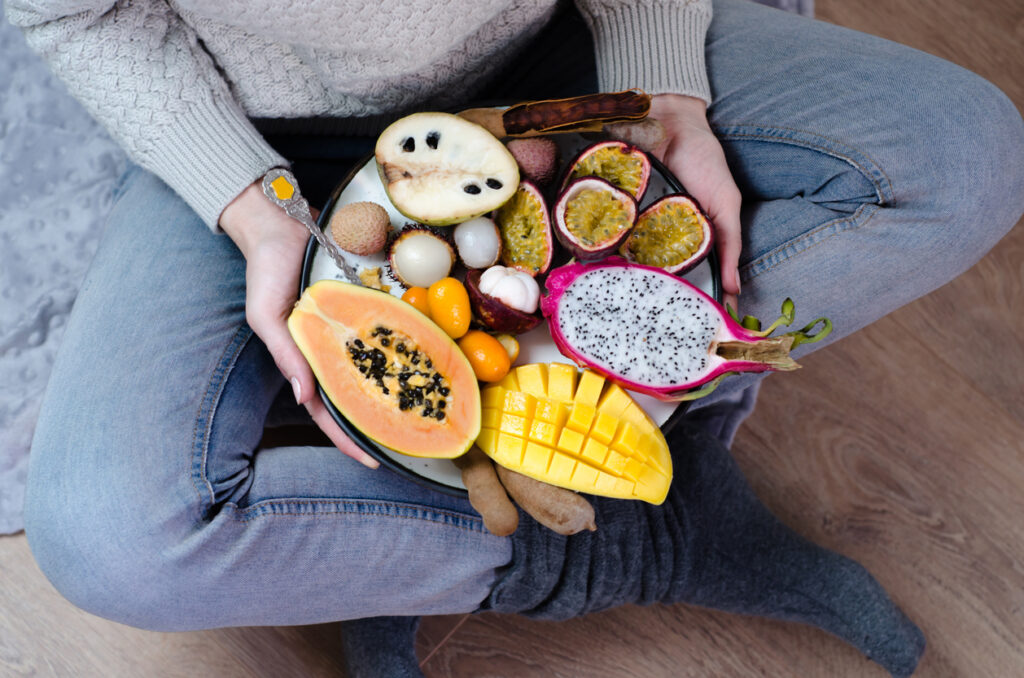
Let’s start by looking at known causes of insulin- and blood sugar dysregulation:
Causes of insulin resistance
Are simple sugars in fruits a culprit of insulin issues? Science says no, they are not, and we will get into the reasons below! In fact, sugar in fruits presents two paradoxes in health concerning insulin and weight:
- Fruits are high in simple sugars, but do not contribute to weight gain – they even counteract obesity (read more here).
- Fruits contain sugar but have been continually shown to help regulate insulin and prevent diabetes (see below).
So what are the main contributors? Insulin issues often arise from a combination of unhealthy lifestyles (processed foods and lack of physical activity) and toxic overload. Here is a list of the main culprits:
- Environmental toxins: Some compounds mess with hormones, some block enzymes, others impact our microbiome – the negative effects of the cocktail we are exposed to are nearly endless. Those are all factors that potentially impact insulin production and receptors. Some hormonal disruptors in our everyday life can cause insulin resistance: Phthalates, heavy metals, and compounds from foods cooked at high temperatures (Advanced Glycation End Products AGEs). A huge problem can also come from medications and residues from pollution of such products or other chemical products. A small portion of many substances always end up within our body.
- Too much calories and fat intake! Being overweight, lipotoxicity, and dietary-induced inflammation have been shown to be a cause of insulin dysregulation (Sears & Perry, 2015). Fatty acids disturb insulin signaling, the function of insulin receptors, and, thus, glucose uptake into cells (Shetty & Kumari, 2021). This is also called “intracellular Lipid Accumulation”: Excessive intake of saturated fatty acids can lead to the accumulation of lipids (fats) within cells, particularly in tissues like skeletal muscle and liver.
- Sugars in processed foods: Processed foods cause chronic conditions, including blood sugar regulation. A key question is if the isolated sugar cause insulin issues, or other factors in processed foods! After all, sugar itself is not toxic, but we have adopted a skewed view of carbs and sweet fruits because of the current war on sugar! In fact, natural, simple sugars – including fructose-rich honey – are increasingly recognized as antidiabetic foods! This should not come as a surprise, knowing that honey and grape molasses are an ancient remedy. Thus, simple sugars alone cannot be the main culprit in insulin dysregulation! However, when eating a high-fruit diet, too much fructose from natural sources is not a thing! What seems like a no-brainer is also supported by research on the effects of fruits on health, even in people with insulin problems. And, if we still have doubts, we can ask a chimpanzee in nature if fruits mess with his insulin and blood sugar!
- Anti-nutrients from grains and legumes and complex carbs: The huge load of anti-nutrients found in certain food groups (mainly grains and legumes) can lead to nutritional shortcomings because they can interfere with intestinal health and absorption. And, while complex carbs are often recommended as a better choice with blood sugar issues, most complex crabs are products made from anti-nutrient-rich grains. Nutritional deficiencies can aggregate insulin regulation:
- Nutritional deficiencies: Nutritional deficiencies can contribute to suboptimal insulin production or sensitivity: Optimal vitamin D, vitamin C, magnesium, B-vitamins, chromium and other trace elements are all needed in insulin and glucose metabolism. Some of those nutrients are only obtained in optimal amounts if we get enough high-quality tropical fruits! Check out the nutrients that help insulin regulation in fruits below!
Fruits do not cause insulin issues
Simple sugars are not toxic like the “war on sugar” likes having us believe! They are energy carriers, and build up the energetic basis of all plants and animals! “Glucose toxicity” is a term used to describe the associated problem when glucose cannot be taken into the cells due to insulin issues! Fruits, despite being a sugar-rich food, are well-known to help insulin regulation:
“Fruit, but not fruit juice, intake is inversely associated with type 2 diabetes mellitus (T2DM). However, questions remain about the mechanisms by which fruits may confer protection.”
Bondonno et al., 2021
While the mechanism is not entirely known, and the fruit sugar “paradox” still seems to surprise the nutritional world, in times of war on sugar, there are nutritional and biological aspects that can explain the phenomenon very-well:
The How: How do fruits help regulate insulin?
How can fruit help prevent diabetes or even regulate inulin and blood sugar once the problems have started? For this question, we need to shift our focus away from only sugars to the regenerative, nutritional aspects of fruit. Besides the often-mentioned fibers and antioxidants, fruits contain a variety of micronutrients and minerals that are involved in insulin production and receptors:
- Chromium: Chromium is a mineral obtained mainly from fruits, and it is essential for insulin to do its job! Chromium enhances the action of insulin by increasing the sensitivity of insulin receptors on cells. This means that cells are more responsive to the presence of insulin, which can lead to better glucose uptake from the bloodstream into cells.
- High vitamin C: Vitamin C increases insulin production and reduces blood sugars. And the antioxidant power of vitamin C reduces oxidative stress, which contributes to insulin resistance. Vitamin C is important for collagen needed for vascular health and can, thus, improve insulin distribution. If we do not adopt a high-fruit diet, we constantly fall short in the important antioxidant, and get much less vitamin C than other mammals, which produce the compound themselves. Adult humans need around 2000-3000 mg of vitamin C daily for optimal levels. Read more about the special case of vitamin C shortcomings in our in-depth article on vitamin C requirements of frugivores.
- Potassium: Low potassium can lead to lower insulin production. Fruits – in particular tropical fruits – are our most important potassium source. If you cut back on fruits, you might get a suboptimal potassium intake.
- Copper: Copper plays a role in insulin resistance and needs to be balanced with other minerals – like in fruits. Copper-containing enzymes, such as cytochrome c oxidase, are essential for cellular respiration and energy production. Proper energy metabolism is important for maintaining insulin sensitivity and overall glucose homeostasis.
- Boron: Boron has been proposed to have a role in enhancing insulin sensitivity. Improved insulin sensitivity means that cells respond more effectively to the insulin signal, leading to better glucose uptake and regulation. Further, boron has been suggested to play a role in calcium and magnesium regulation. Both of these minerals are involved in insulin secretion and function.
- Fructans and the microbiome: Fructans are oligo-fructose molecules, that contribute to the health of the microbiome. A healthy microbiome is important for nearly every aspect of health, including insulin sensitivity.
- Kidney health: A high-fruit diet is the most beneficial diet for proper kidney function. Healthy kidneys are key to glucose metabolism and insulin sensitivity! Healthy kidneys are crucial for hormonal balance and metabolic health. They reduce inflammation and oxidative stress, as they are the main route of clearing waste and avoid the accumulation of toxins that affect – among many other things – insulin signaling.
Even sweet, high-sugar fruits have anti-diabetic effects!
Although low-sugar fruits are often the focus of the many studies and the recommended fruits for people with insulin issues, many sweet, high-sugar fruits have anti-diabetic effects, like mango and banana.
The probably sweetest fruits, dates, which are very high in simple sugar, even showed positive effects in diabetic rats and were beneficial for insulin production:
The recent study Ajiboye et al. found the following benefits of a diet based on sweet dates (P. dactylifera fruit based-diet) in diabetic rats:
- increase in insulin levels
- increased glycogen levels
- increased antioxidant enzyme activities
- reduced fasting glucose levels
- reduced cytokine levels (inflammation)
- reduced cholesterol
- reduced low-density lipoproteins and very low-density lipoproteins
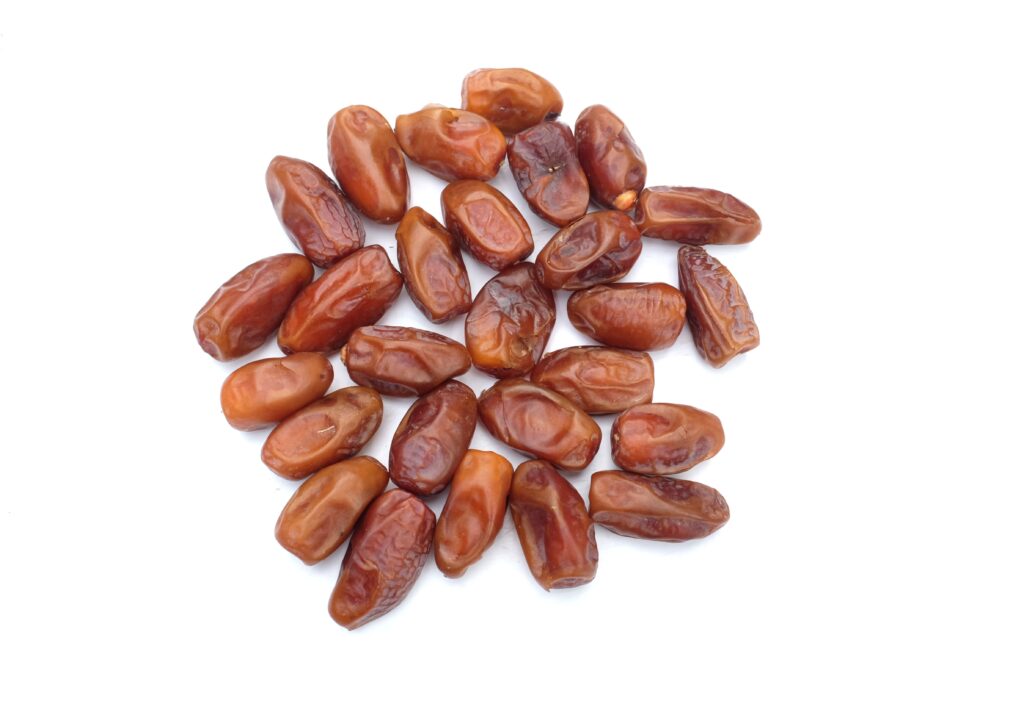
They conclude that dates (a high-sugar fruit) “could be an alternative nutraceutical means of managing diabetes mellitus and its complications.” (Ajiboye et al., 2020). In this context, it is important to mention that rats naturally are fruit-eaters, and thus are adapted to eating a diet high in fruits – like most primates, all apes, including humans (see below).
In fact, natural, simple sugars – including fructose-rich honey – are increasingly recognized as antidiabetic foods! This should not come as a surprise, knowing that honey and grape molasses are an ancient remedy. Thus, simple sugars alone cannot be the main culprit in insulin dysregulation!
The Why: Humans are adapted to eating sweet, sugary fruits!
After elaborating on all the details and taking a reductionist approach, it might be useful to zoom out and see if this all makes sense from an ecological perspective. While nutrition asks “how?”, evolution asks “why?”
There is a good reason why fruits are so beneficial for health: Humans come from frugivorous ancestry! We are still adapted as frugivores! Humans are anatomically and physiologically specialized in fruit-eating and thus fruits are the foods we have evolved with and adapted to eat!
Like most primates, including chimpanzees, humans are biological frugivores!
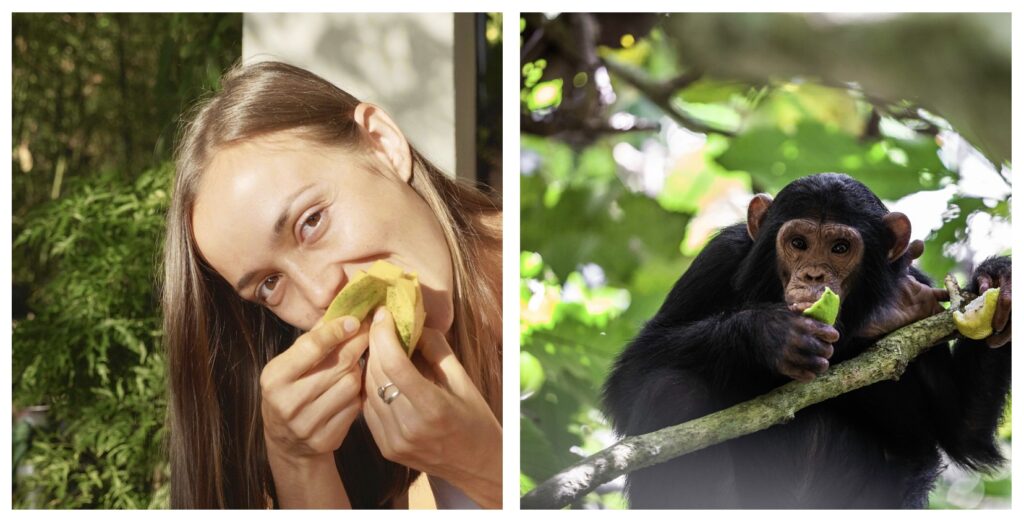
Chimpanzees eat around 3-6 kg of fruits per day! Wild tropical fruits – the food source of wild primates – contain even more fructose than cultivated fruits, which contain more sucrose.
“Humans clearly come from an evolutionary past in which hexose (fructose) – rather than sucrose-dominated fruits were consumed, and human digestive physiology should, therefore, be best adapted to a carbohydrate substrate similar to that of wild fruits.”
Kathrine Milton; 1999
Fruits and blood sugar
All carb-rich foods have an effect on blood sugar. However, the effect differs depending on the type of carbs and how it’s delivered by the food. Fruits are different as a carb source than grains, starches or vegetables.
How fruit sugars differ from complex carbs
After eating carbs, sugar molecules reach the bloodstream, thus elevating blood sugar levels. The pancreas then starts to produce insulin, which needs to be present for glucose (not fructose) to be absorbed by cells to be used as energy.
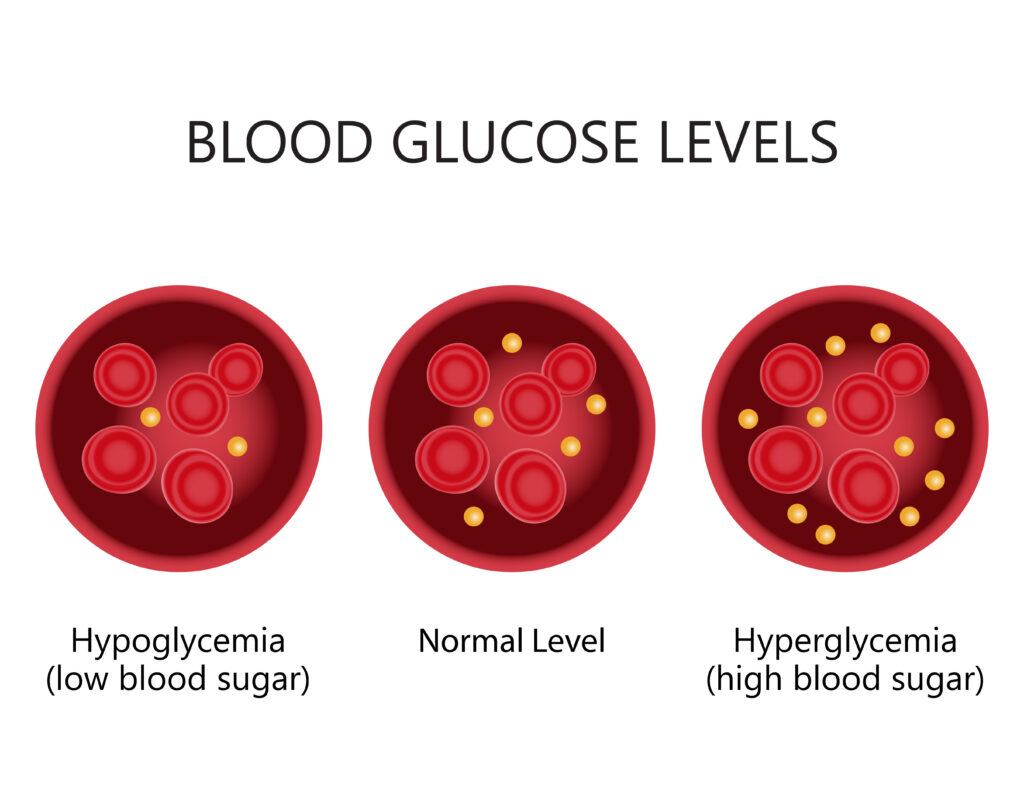
Let’s see how carbs can differ depending on the source:
1. Carbs are either chained up, or simple: There are complex carbs in grains and starches, and simple, sweet carbs in fruits, and veggies. Complex carbs have to be broken down first, before entering the bloodstream. Simple carbs are quicker to absorb. However, there are fibers in every natural plant food, which slow down the uptake of sugar molecules. This is also true for fruits!
All carbohydrate-rich foods we eat contain glucose, but in complex carbs, the glucose molecules are linked in chains to each other (which is why they don’t taste sweet). However, complex carbs are broken down into simple sugar (glucose) during digestion. This is why the carb load and density of complex-carb foods are higher than in sweet fruits. Many people are not aware of the fact, that eating rice and pasta delivers more carbs per unit than sweet fruit.
2. Different types of carbs in foods: There are different types of sugar molecules. Most plant foods, including starches and grains, contain glucose. Fruits contain two main sugar types, glucose and fructose. Those are different in terms of blood sugar elevation! The reason for this is that glucose in blood enters cells via different routes than fructose. Fructose is readily available for different types of cells (including muscle and brain cells) without the need for insulin (see below).
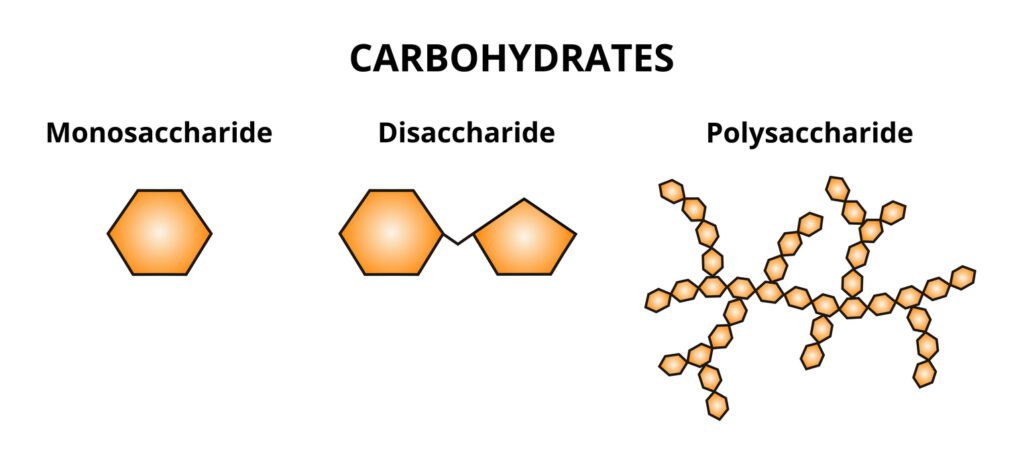
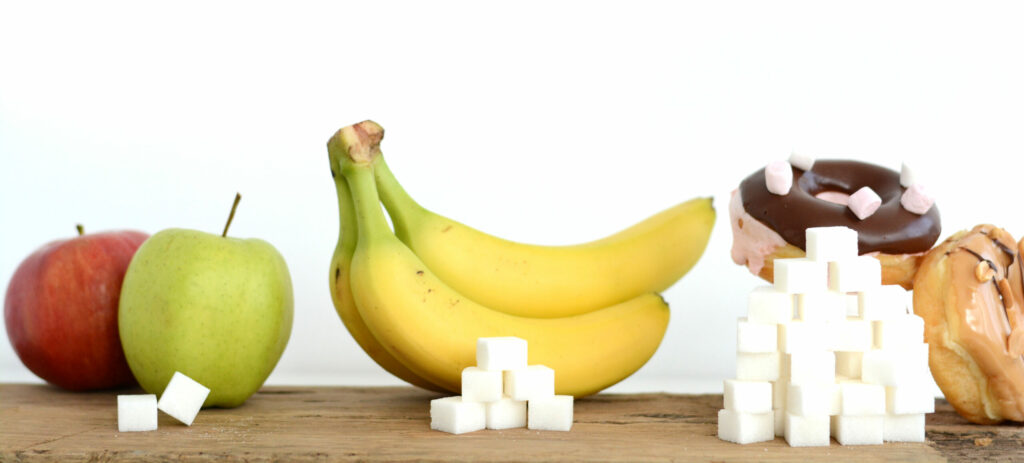
This type of pictures are confusing because the sugars found in fruits differ in composition from the added sugar to sweets and the complex sugars in many sweets. Further, fruit contains fibers, that act like a natural controlled-release matrix for sugars. And many sweets contain a substantial amount of fat, which can affect glucose uptake into cells.
Glycemic index of glucose and fructose
The glycemic index measures how quickly sugars get absorbed in the gut and reach the bloodstream, elevating the blood sugar level.
Glucose and fructose have a different glycemic index (GI): Simple glucose is absorbed quickly as it doesn’t need to be split into single molecules before uptake. This is also the reason it is used as a standard for the glycemic index (which is 100).
Compared to that, the glycemic index of isolated fructose is 23, a much lower amount than the GI of glucose.
But why is that?
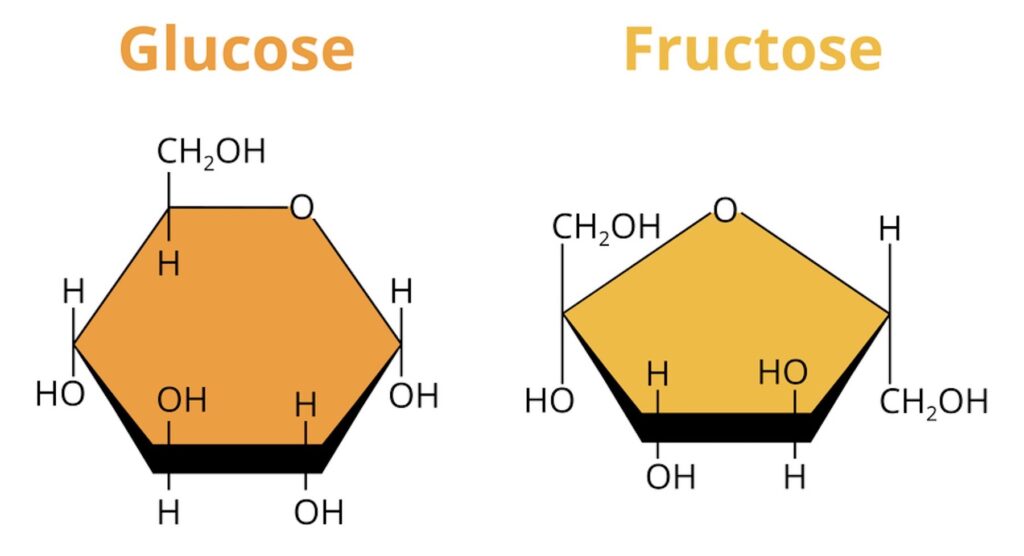
It’s because fructose does not require insulin to enter cells! Fructose gets into cells quickly with the “open door” transporter GLUT5, which is present in many different tissues, including the brain and muscle cells (read more here). Therefore, fructose does not accumulate in the bloodstream like glucose (read more below). Humans have likely evolved such effective fructose transporters because their natural diet is high in fruits – as natural frugivores! Within the cells, fructose is metabolized only slightly differently from glucose, in a process called fructolysis (very similar to the better-known glycolysis).
In contrast to other carb-rich foods, fruits also contain fructose – a special type of sugar.
The bigger picture.
Fructose affects the blood sugar levels much less than glucose as it enters cells quickly, without the need for insulin.
As frugivores, humans have evolved such adaptations to metabolize the sugar from fruit. We are perfectly adapted to eating fruits with a high-sugar content, as those sugars are our primary energy source in nature.
Insulin and fructose
Insulin is a substance that our glands produce to enable glucose into our cells so that the sugar is available for energy production (as fuel) rather than accumulating in the blood. Insulin is an important “door-openener”. What many are not aware of, is that the simple sugar fructose does not require insulin to get into cells.
For this reason, people with blood sugar issues are allowed to eat fruits, and for a while, fructose was even used as a sweetener to avoid insulin and blood sugar spikes!
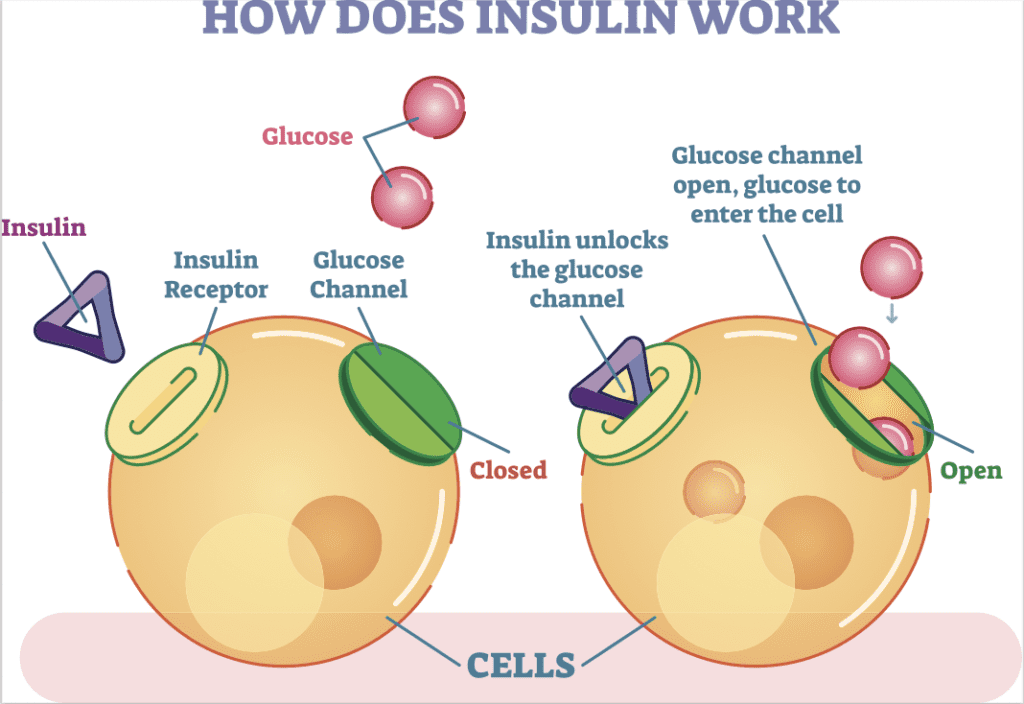
Despite the bad reputation of fructose, which makes up half of the carbs found in fruits, fructose does not trigger an insulin response. Only glucose – the type of sugar found in starches and complex carbs – does.
Fructose from fruits is healthy – but isolated fructose is not.
Isolated, processed fructose, in the form of added high-fructose corn syrup, has been shown to be bad for you. On the other hand, fructose from natural sources – fruits – has been shown to be highly beneficial for health: Newer studies have shown that fructose can actually be key to unlocking several metabolic pathways important for basic cell development and functioning. Read or full article on the benefits of fructose from fruits!
From increased energy production to possibly even help in degenerative health conditions: we need to stop seeing sugars as an enemy, but realize that carbs are energetic nutrition! Without sugar there is no life – as with all molecules and foods, we just need to get the right amount and type, which is natural foods that we have evolved to eat.
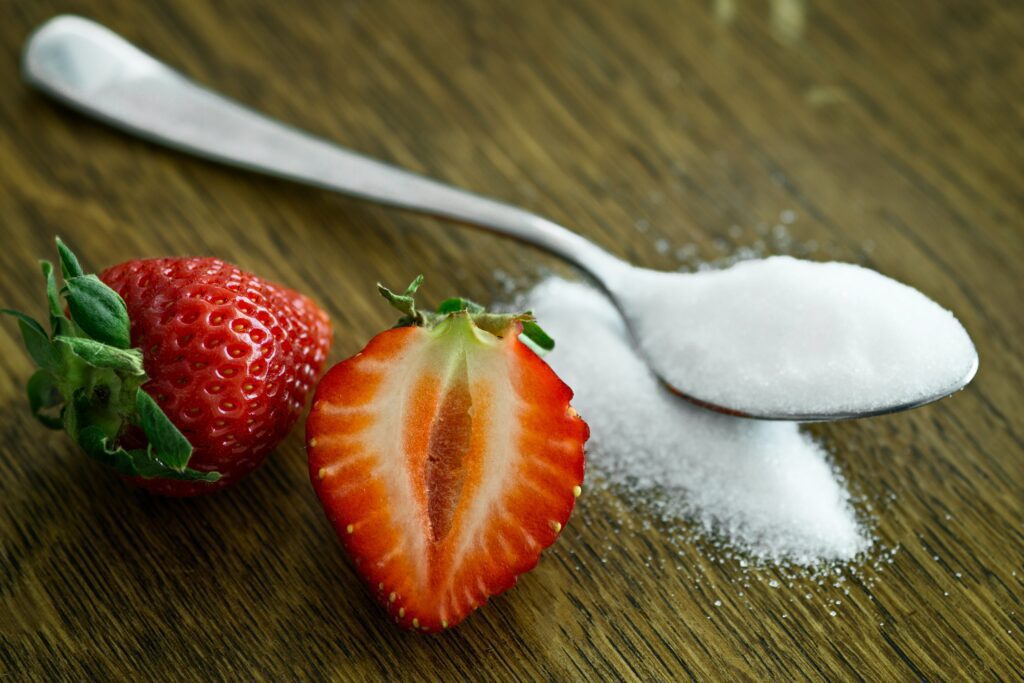
Fructose in fruits has a different health effect than man-made isolated fructose products! For example, fructose from fructose syrup disrupts the intestinal microbiome, while fructose in fruit (inulin and other fructans) feeds our beneficial bacteria!
The consensus in nutrition science is that whole fruits are health-promoting, which comes at no surprise to the natural health community and most of humanity.
It is important to notice, fruit juices do not contain natural fiber and thus have a different effect in terms of sugar uptake. And it is important to notice that fruit juices can vastly differ in quality: raw fresh juices cannot be compared to processed, sweetened juices, that resemble more sodas than a natural product. Unfortunately, this differentiation is not made in many studies!
Can you eat fruits if you already deal with insulin resistance?
Yes. Firstly, fruits contain fiber, are low-glycaemic, (contain 50% of non-insulin triggering fructose ), and do not contain more glucose than complex carbs (quite to the contrary). For these reasons, fruits as a group are not canceled on typical diabetes diets. However, the usual advice is to restrict the intake of fruits high in sugar, like bananas, mangoes, etc., which is very confusing when trying to adopt a high-fruit diet!
Current official recommendation
It has been shown by almost all studies that fruits are not only beneficial for healthy people but also for people with insulin issues. But people with insulin dysregulation are especially sensitive to blood sugar levels, they still need to consider the sugars from fruit: While approximately 80-90% of fruit mass is composed of water, the rest is fiber, vitamins, minerals, but also sugars like glucose, fructose, and saccharose. This means the sugar content in fruit could potentially cause high blood sugar and insulin levels.
Different health organizations have different recommendations on how much fruit to consume daily, depending also on the type of fruit. One way to deal with insulin sensitivity is by checking the glycemic index of the fruits. The American Diabetes Association (ADA) reports that this is a viable choice for people who track GI scores in their diet. The ADA also states that fresh, frozen, or canned fruit without added sugars is the best option for this, while dry fruit also seems appealing due to its high content of sugar density. The Korean Nutrition Society recommends 1 – 4 servings of fruit per day, each containing about 50 kcal. The U.S. Department of Agriculture uses a different approach, which states that each meal should contain 10% fruit. The World Health Organization (WHO) advises the intake of about 400 g of fruit and vegetables combined.
It is important to notice that all health organizations agree on the fact that the amount of fruit depends on the kind of fruit, as for example a banana and an apple have a different glycemic index and contain different amounts of fructose or glucose. Recommended fruits are apples, berries, apricots, and peaches. Fruits with a high sugar content are officially not advised and should be treated like sweets, these could be pineapple, banana, or even grapes.
These recommendations are frustrating for people trying to adopt a high-fruit diet. So how can we strive towards our natural human diet none-the-less?
How to adopt a high-fruit diet despite blood sugar issues
Diabetes UK points out that we need to put things into perspective: a portion of fruit contains approximately the same amount of carbs as a slice (“portion”) of bread. If we substitute complex carbs with natural, simple carbs (fruits), we need the same amount of insulin (or less, when taking into account that fructose does not require insulin) for the metabolization. After all, we all need carbs as energy source (read why keto is not the solution, here).
So, how can you approach a high fruit diet? Go step by step with detoxification:
- Choose low-glycemic fruits at first: Start with low-sugar raw foods and greens. Work your way up. Increase sugar-rich fruits slowly, while detoxing on fruits lower in sugar, vegetable fruits, and veggies.
- Don’t consume sweet fruits together with fats. Fats disturb sugar uptake, which is why you should avoid the combination of sweet and fatty.
- Replace complex carbs with carbs from fruits: If you consume complex carbs, you get higher glucose density per unit than sweet, simple fruit carbs! Instead of managing complex carbs, you can start managing carbs from fruits.
- Do not drink smoothies, nor juices: Fruit juices raise blood sugar levels more, as the fiber is removed.
- Correct nutritional deficiencies and avoid common mistakes on a fruit-based diet. See our guides below.
Monitor your blood sugar regularly to understand better how your body reacts to fruits. This will also help you see gradual changes and decrease your sweet fruit intake over time. Here is an example showing that it can be done:
Conclusion
Fruits provide nutrients to improve insulin regulation and have been shown to be beneficial for blood sugar issues in the long run. Still, the dogma, that fruits – especially sweet fruits – should be largely avoided is persistent. This is much to the detriment of people trying to overcome insulin issues naturally! Fruits should be a substantial part of everyone’s diet for optimal health, and it has been shown possible to overcome insulin issues by gradually changing the diet towards a high-fruit diet – step by step.
This conclusion is not an “out-of-the-box perspective” but falls in line with many “official” reports – but the misconception of fruits being not suitable for people with insulin dysregulation is still prevalent. I’d like to cite Diabetes UK to underline the view shared in this article:
“Managing diabetes has to do with managing your long-term blood glucose, blood fats, blood pressure and your weight, and fruits and vegetables can play a positive role in all these. The concern has been that because fruits contain sugar, it makes your blood glucose go up. In fact, most fruits have low to medium glycaemic index, so they do not lead to a sharp rise in your blood glucose levels compared to other carbohydrate-containing foods like white or wholemeal bread.”
Diabetes UK
References
- Lim, S.S. et al. (2012) ‘A comparative risk assessment of burden of disease and injury attributable to 67 risk factors and risk factor clusters in 21 regions, 1990–2010: A systematic analysis for the global burden of disease study 2010’, The Lancet, 380(9859), pp. 2224–2260. doi:10.1016/s0140-6736(12)61766-8.
- Guyenet, S.J. (2019) ‘Impact of whole, fresh fruit consumption on energy intake and adiposity: A systematic review’, Frontiers in Nutrition, 6. doi:10.3389/fnut.2019.00066.
- Park, H.A. (2021) ‘Fruit intake to prevent and control hypertension and diabetes’, Korean Journal of Family Medicine, 42(1), pp. 9–16. doi:10.4082/kjfm.20.0225.
- Sears, B. and Perry, M. (2015) ‘The role of fatty acids in insulin resistance’, Lipids in Health and Disease, 14(1). doi:10.1186/s12944-015-0123-1.
- Shetty, S. and Kumari, S. (2021) ‘Fatty acids and their role in type‑2 diabetes (review)’, Experimental and Therapeutic Medicine, 22(1). doi:10.3892/etm.2021.10138.
- Hervik, S.E., Hervik, A.K. and Thurston, M. (2021) ‘From science to sensational headline: A critical examination of the “sugar as toxic” narrative’, Food, Culture & Society, 25(3), pp. 505–519. doi:10.1080/15528014.2021.1899527.
- Bobiş, O., Dezmirean, D.S. and Moise, A.R. (2018) ‘Honey and diabetes: The importance of natural simple sugars in diet for preventing and treating different type of diabetes’, Oxidative Medicine and Cellular Longevity, 2018, pp. 1–12. doi:10.1155/2018/4757893.
- Li, M. et al. (2014a) ‘Fruit and vegetable intake and risk of type 2 diabetes mellitus: Meta-analysis of prospective cohort studies’, BMJ Open, 4(11). doi:10.1136/bmjopen-2014-005497.
- Kawahito, S., Kitahata, H. and Oshita, S. (2009) ‘Problems associated with glucose toxicity: Role of hyperglycemia-induced oxidative stress’, World Journal of Gastroenterology, 15(33), p. 4137. doi:10.3748/wjg.15.4137.
- Bondonno, N.P. et al. (2021) ‘Associations between fruit intake and risk of diabetes in the AUSDIAB COHORT’, The Journal of Clinical Endocrinology & Metabolism, 106(10). doi:10.1210/clinem/dgab335.
- The link between diabetes and potassium (no date) WebMD. Available at: https://www.webmd.com/diabetes/potassium-diabetes#:~:text=If%20your%20potassium%20levels%20are,those%20with%20normal%20potassium%20levels. (Accessed: 26 August 2023).
- Havel PJ. A scientific review: the role of chromium in insulin resistance. Diabetes Educ. 2004;Suppl:2-14. PMID: 15208835.
- Shi, L. et al. (2020) ‘Ascorbic acid supplementation in type 2 diabetes mellitus’, Medicine, 99(45). doi:10.1097/md.0000000000023125.
- Price, C.A. et al. (2022) ‘Differences in gut microbiome by insulin sensitivity status in black and white women of the National Growth and Health Study (NGHS): A pilot study’, PLOS ONE, 17(1). doi:10.1371/journal.pone.0259889.
- Bjørklund, G. et al. (2020) ‘The role of zinc and copper in insulin resistance and diabetes mellitus’, Current Medicinal Chemistry, 27(39), pp. 6643–6657. doi:10.2174/0929867326666190902122155.
- Horn, D. and Barrientos, A. (2008) ‘Mitochondrial copper metabolism and delivery to cytochromec oxidase’, IUBMB Life, 60(7), pp. 421–429. doi:10.1002/iub.50. Kucukkurt, I. et al. (2013) ‘The effects of dietary boron compounds in supplemented diet on hormonal activity and some biochemical parameters in rats’, Toxicology and Industrial Health, 31(3), pp. 255–260. doi:10.1177/0748233712469648.
- Ajiboye, B.O., Oloyede, H.O. and Salawu, M.O. (2020) Phoenix dactylifera linn fruit based-diets palliate hyperglycemia in alloxan-induced diabetic rats. Journal of Basic and Clinical Physiology and Pharmacology, 32(1). doi:10.1515/jbcpp-2019-0185.
- K. Milton, Nutritional characteristics of wild primate foods: Do the diets of our closest living relatives have lessons for us? Nutrition. 15, 488–498 (1999), doi:10.1016/s0899-9007(99)00078-7
- Bantle, J.P. (2009) ‘Dietary fructose and metabolic syndrome and diabetes’, The Journal of Nutrition, 139(6). doi:10.3945/jn.108.098020.
- Diabetes Diet, eating, & physical activity (no date) National Institute of Diabetes and Digestive and Kidney Diseases. Available at: https://www.niddk.nih.gov/health-information/diabetes/overview/diet-eating-physical-activity (Accessed: 25 August 2023).
- Fruit (no date) American Diabetes Association ADA. Available at: https://diabetes.org/healthy-living/recipes-nutrition/eating-well/fruit#:~:text=Most%20fruits%20have%20a%20low,guide%20food%20choices—so%20enjoy. (Accessed: 25 August 2023).
- Park, H.A. (2021a) ‘Fruit intake to prevent and control hypertension and diabetes’, Korean Journal of Family Medicine, 42(1), pp. 9–16. doi:10.4082/kjfm.20.0225. Park, H.A. (2021a) ‘Fruit intake to prevent and control hypertension and diabetes’, Korean Journal of Family Medicine, 42(1), pp. 9–16. doi:10.4082/kjfm.20.0225.
- Park, H.A. (2021a) ‘Fruit intake to prevent and control hypertension and diabetes’, Korean Journal of Family Medicine, 42(1), pp. 9–16. doi:10.4082/kjfm.20.0225.
- Chapple B. (no date a) Myth: I can’t eat fruit if I have diabetes, Diabetes UK. Available at: https://www.diabetes.org.uk/guide-to-diabetes/enjoy-food/eating-with-diabetes/diabetes-food-myths/myth-fruit-diabetes (Accessed: 25 August 2023).
This article was last updated on:

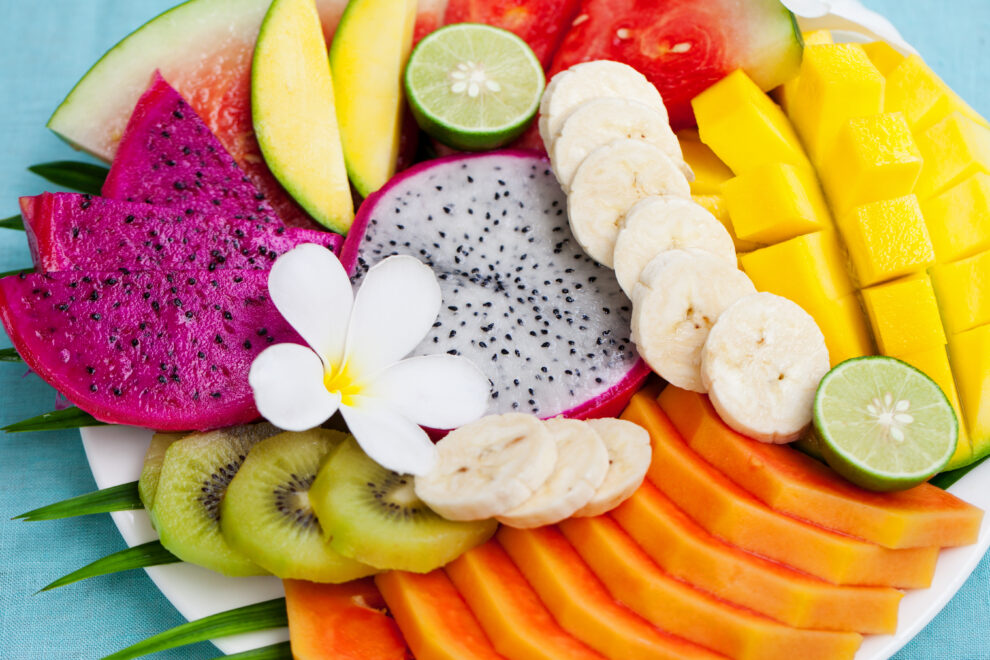
Add Comment